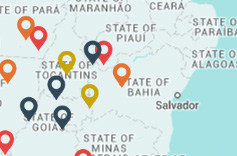Popular World Cup Committee of São Paulo
World Cup for whom? Strengthening popular resistance through communication
São Paulo
Objetivos e público prioritário
The goal is to continue the training and mobilization of the impacted population and promote a debate on “legacies” and consolidate coordination in order to continue the popular mobilization for the right to the city with regard to the impacts of the mega-event on the public deficit.
Main activities
– Six debates: training activities and communication jointly proposed with the community in consideration of the pertinent issues of each locale and its relation to the 2014 World Cup, offering those involved the benefit of exchanging experiences.
– Second Rebel Cup for Social Movements – a political, cultural sporting event that brings together social movements and those affected by the World Cup in São Paulo.
– Production of content – radio skits, the World Cup for Whom? Newsletter, pamphlets, stickers, stencils, graffiti, blogs and social networks;
– Production of a short documentary on the impacts of and resistance to the World Cup in São Paulo;
– Participation in the First Encounter of those Affected by Mega-Events and Mega-Projects in Brazil
Context
In São Paulo, the World Cup accelerated the process of forced removals in several areas of the city, affecting most of all the eastern region (Itaquera), whose land valuation rose up to 100%. Aside from the direct removal of residents, this has also caused the gentrification of the neighborhood, that is, those who already could barely afford the costs of living have been expelled to more distant regions with even less urban infrastructure. In relation to work, there have already been seven construction worker deaths at World Cup stadiums and more than 140,000 street vendors in São Paulo have been persecuted and blocked from exercising their only means of income. A situation involving slave labor at the expansion of Guarulhos International Airport has also been denounced. In relation to women, children and adolescents, we have accompanied denunciations of sexual exploitation and child prostitution in the stadium region and it is known that sexual tourism increases during the realization of mega-events. In the city center, the homeless population increased dramatically and has suffered from systematic state violence, with the military police the only mechanism for State mediation.
In recent protests that took to the streets, this same state violence has been repeated against social movements and youth that seek to exercise their civil and political rights. The State has constructed a new legal framework, aiming to install exceptional courts to hear cases during the World Cup, without due legal process and the right to an ample defense, casting the crimes as terrorism, which presents a new threat to criminalize social movements.
About the organization
The Popular World Cup Committee of São Paulo’s mission is to coordinate among a group of organizations, social movements, legal professionals, students, researchers, cultural collectives and citizens in general to denounce the impacts and human rights violations and strengthen the resistance against the 2014 FIFA World Cup in São Paulo, reinforcing existent spaces and creating new ones to add to the resistance.
Partnerships
The World Cup People's Committee of São Paulo is affiliated nationally with the National Network of Popular World Cup Committees (ANCOP); and with organizations such as Movimento Passe Livre (Free Fare Movement), Homeless Workers' Movement, People's Health Forum, United Communities of Itaquera, Conectas Human Rights and Forum of Street Workers.
Results
The preparation, production and dissemination of material relied on the participation of the Street Network, who filmed the Committee’s actions such as public acts and debates. The videos were made available through the communication channels of the Street Network and the Committee. Banners, flyers and posters were also produced, in addition to publishing editions of the People’s World Cup Newspaper. The debates that were held in the communities brought together residents, students, participants of social movements and civil society representatives. Other debates were held at universities together with research presentations about the impact of the World Cup on São Paulo and Salvador.
Funding Line
Mega-Events (2014)
Year
-
Total Granted
R$ 24,950.00
Duration
12 months
Main Themes
The right to just and sustainable cities






